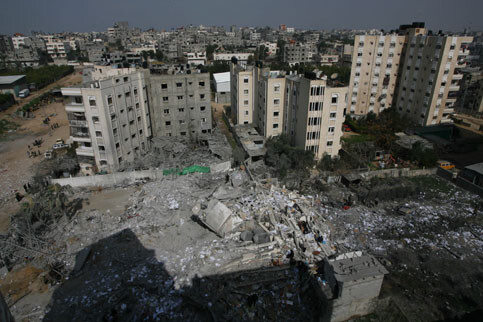The Electronic Intifada 4 March 2008

The destroyed Palestinian General Fedration of Trade Unions building in Gaza City, 29 February 2008. (Wissam Nassar/MaanImages)
GAZA CITY, 4 March (IPS) - Two F-16 missiles were all it took to bring down the five-story headquarters of the Palestinian General Federation of Trade Unions (PGFTU).
The Union, established in 1965, is one of the forerunners of the movement calling for an international boycott of Israel, and imposition of sanctions on it until Israel meets its obligations over UN resolutions, borders, and the right of Palestinian refugees to return to their homeland.
Following the bombing last Thursday, Union members have resumed their work from a tent, gathering what files and paper they could from under the rubble.
“The occupation doesn’t need any justifications to commit crimes against Palestinians,” Nabil al-Mabhouh, acting head of the Palestinian General Federation of Trade Unions in Gaza told IPS. But the building had apparently been targeted because “we at PGFTU are supporting the rights of tens of thousands of Palestinian workers.”
Mabhouh said theirs is not a militant organization, but a “rights-based organization open to all people from different political affiliations and locations. We have relations with many international trade unions.” The building, he said, had come up with Norwegian money.
“Targeting a civil organization shows how barbaric and outrageous the Israeli occupation is,” he said. “We are not launching rockets; targeting a laborers union building is not justified.”
The building, he said, had been used to offer health services to tens of thousands of workers and their families, through a workers union health insurance.
“We strongly condemn this crime which aims to break down the Palestinian laborers, and call for all trade unions in the world to stand by us and protect the Palestinian laborers from such criminal practices.”
As always with such bombings, neighboring houses were damaged as well in the attack.
Palestinian officials estimate that Israel used two one-ton missiles on this densely-populated civilian area, which explains the extensive damage to hundreds of flats around.
The losses are significant: aside from one dead and 37 injured, mostly women and children, some of them in critical condition in Shifa hospital, there has been considerable damage to the structure of surrounding houses. Countless windows and doors were blown off, and the damage to weight-bearing structural walls mean that rebuilding will be necessary — but impossible, due to the Israeli siege and lack of building materials.
If the Israeli aim was to also terrorize the civilian population, it worked.
A young mother said she was asleep when the bombing began; she woke up to find her entire building shaking. Her five children continued to scream all night, begging the parents to hide them somewhere safe.
She said she cannot replace window panes. “We can’t even afford to buy nylon [to cover the windows],” said her husband, adding that he hadn’t worked for the past two years. He can afford nothing but bare food.
The explosion plunged the entire area into darkness, as electricity wires were cut off. It also caused water shortage after water tanks were hit by shrapnel and began to leak. Days later, there is still no running water in homes.
Abu Eidah’s car outside was damaged by falling debris, as was most of their furniture and assets. But at least the family survived the strike to tell the story.
Abu Eidah is now searching desperately for another house. Another air strike in the neighborhood, and the flats could come down. A relative has offered Abu Eidah an apartment that he and his family may now have to move into.
The number of homeless families has increased throughout Gaza, as has the demand for apartments on rent — tents from aid agencies can hardly protect residents from the cold and rain of Gaza’s winter. Meanwhile, people rendered homeless by the bombing continue to haul in donkey carts to move whatever furniture and belongings survived the shelling. But only a few can leave; hundreds of other families have no option but to stay put, amidst the rubble in the cold of winter.
All rights reserved, IPS - Inter Press Service (2008). Total or partial publication, retransmission or sale forbidden.
Related Links




